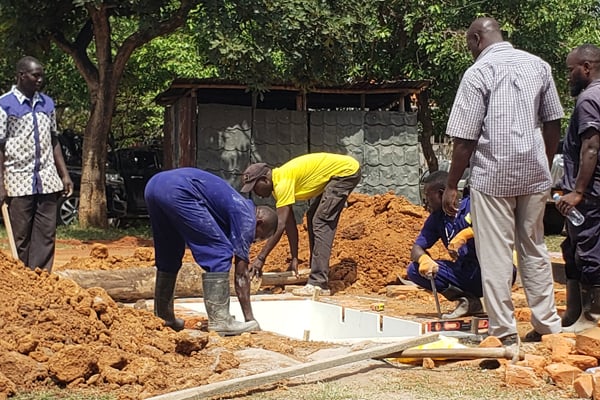Prime
Family explains Acholi burial rites

Mourners pay their last respects to former Speaker of Parliament Jacob Oulanyah in Omoro District yesterday. PHOTO / MARKO TAIBOT
What you need to know:
- Without disclosing details, Mr Milton Omara, the deceased’s uncle, said a consensus had been reached to bury Oulanyah according to culture in addition to the state funeral. He also clarified that the burial of the former Speaker will not be “ritualised”.
The family of former Speaker Jacob Oulanyah has revealed that the state burial will be accompanied by cultural (burial) rites.
Without disclosing details, Mr Milton Omara, the deceased’s uncle, said a consensus had been reached to bury Oulanyah according to culture in addition to the state funeral. He also clarified that the burial of the former Speaker will not be “ritualised”.
Once the UPDF chopper carrying the remains of Oulanyah landed at Lalogi Primary School on Wednesday evening, a group of elderly men and women dressed in traditional attires lined up to perform the royal (Bwola) dance.
They also performed the same dances and songs while escorting the convoy carrying his body to his home in Lalogi Sub-county, nearly 10km from the school.
The dances are part of the rites performed to honour and pay last respects to the deceased. The performance is preserved for funerals of royals and influential persons and elders, including traditional marriages.
Earlier on Wednesday, Mr Ambrose Olaa, the Acholi Chiefdom Prime Minister, revealed that all was set to bury Oulanyah the cultural way.
He said traditional rituals were conducted once the deceased died of exceptional circumstances, such as killing “once not performed, the consequence is that, the spirit of the dead returns to seek revenge inside the family”.
“Until now, we have not found any exceptional circumstances regarding the death of Oulanyah so we cannot bury him in another way, since medical reports say he died of natural causes, it will be the normal way,” Mr Olaa said.
He added that the family agreed that the state funeral goes alongside the traditional burial rites.
“The state burial will happen and then the traditional rites and others will continue, especially after the third day, there are those specific rites, and afterwards the last funeral rites,” Mr Olaa added.
“Because he (Oulanyah) was an influential elder in the Acholi society, old women and men will line up and perform Labang dance (a dance performed to express utmost grief and also to rebuke death not to return to that home),” Mr Kassemiro Ongom, the Patongo clan chief, said.
“There will also be the war dance, Otole, during his funeral. These (funeral dances) will be performed during the day and in the evenings,” he added.
Mr Ling Akita Kilak, the clan chief of Pajule, told Daily Monitor in an interview that because he is a leader who fought for the development of the Acholi and northern region, the war dance will be displayed in his honour.
Mr Akita said Acholi people hold funeral dances in high regard since it is a key uniting factor and also consoles the bereaved family.
“It helps to relieve bad memories of the dead person from the minds of people, as they dance, they enjoy and forget the pain but it also consoles the widow or the widower who would otherwise remain in great pain and grief even after the burial once not performed,” Mr Akita said.
During the vigil, if the deceased is an elder or a leader, who dies of natural causes, songs and dances are performed by only old women and men (who have approached menopause) while they wail and mourn the deceased.
According to Mr Ojara, three days (males) or four days (females) to the deceased’s burial, it is prohibited to eat meat in the family.
He added: “Just like Christians prohibit eating meat on Fridays during the lent period, it is in a similar spirit that meat is not eaten within such days, the vegetable (malakwang) should not be cooked because once mourners eat it, and they become lazy and as a result make the spirit of the dead person lazy to continue guiding the family.”
Mr Ojara further explained that three days (males) or four days (females) after burying the deceased, a ritual called Kwanyo cola (dispelling grief) is performed.
During this ritual, the family of the deceased, led by an old woman, are led to a stream by sunrise where they are bathed using a concoction before they are served okra (Otigo) dish, millet bread, and simsim paste.
DON'T MISS: No, Oulanyah was not poisoned
“The same elderly woman serves them the dishes in a common bowl from which all of them eat. After this, male elders go and strangle a goat to death for a general meal and that is when family members resume eating meat,” Mr Ojara said.
He added that by strangling the goat the spirit of the deceased gets into the goat (which everyone eats) to live in them.




